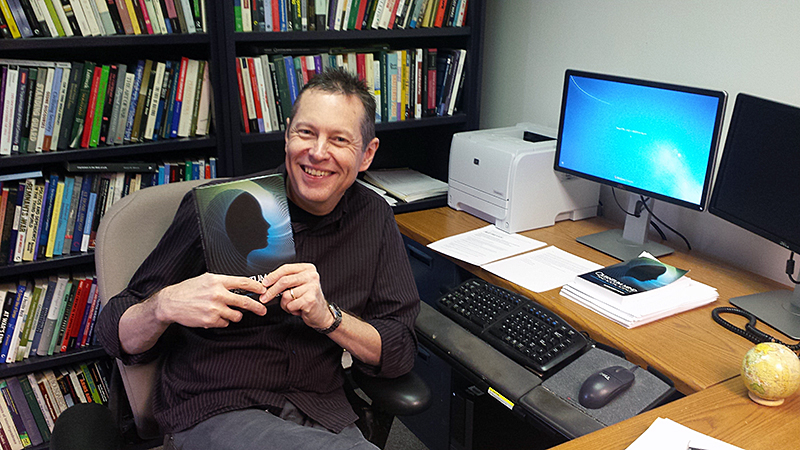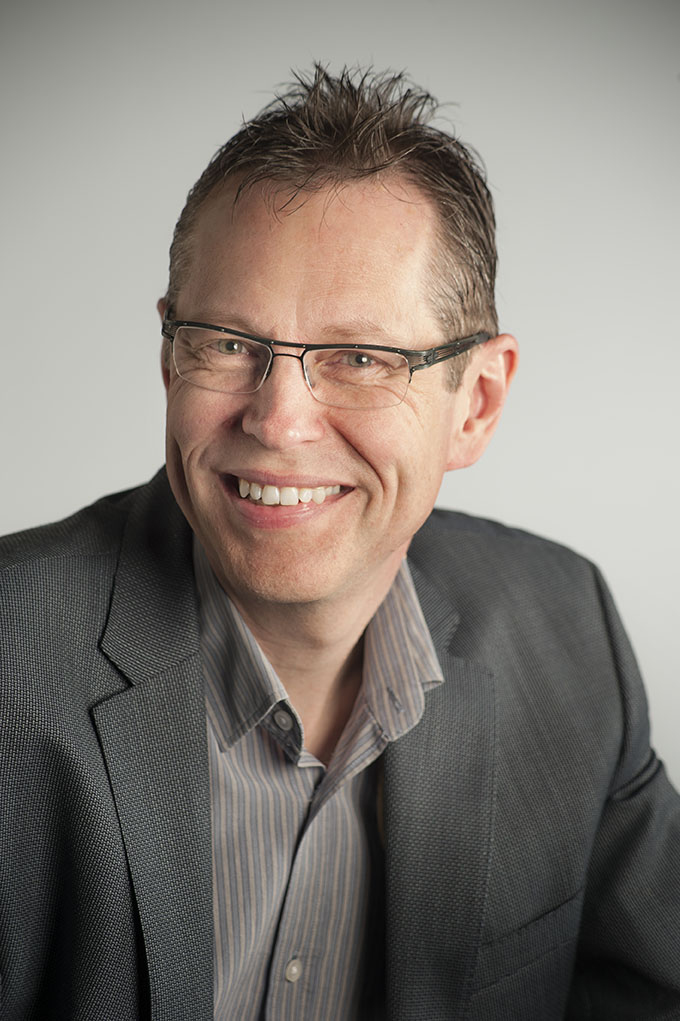
Alexander Wendt, professor of political science and Mershon professor of international security. Credit: Hailey Stangebye | Lantern reporter
Alexander Wendt keeps a tidy office at Ohio State; his books are stacked and shelved, his desk is organized. But beneath this exterior, Wendt, Mershon professor of international security and a professor of political science, is shaking the foundations of social science.
Wendt’s recent publication, “Quantum Mind and Social Science: Unifying Physical and Social Ontology,” is a culmination of 10 years of work. In it, he strives to counter many core assumptions of the social sciences that have been based on classical physics, he said.
“If you were inventing the social sciences today for the first time, and you were looking to physics and saying, ‘OK, which kind of physics is the best basis for social science?’ I think nowadays you would say, ‘Oh, of course, it’s quantum physics — not classical,’” Wendt said. “I think the classical model of man that we talk about is actually wildly counterintuitive.”
Wendt said his interest in quantum consciousness began a little over 10 years ago in the University of Chicago bookstore; he happened to choose a book on quantum consciousness and was quickly absorbed by the radical argument.
On the website quantumconsciousness.org, Stuart Hameroff, director of the University of Arizona’s Center for Consciousness Studies, defined quantum consciousness as the assumption that consciousness is generated from quantum vibrations inside the brain’s neurons, rather than the classical view that consciousness is the result of computation among brain neurons.
“I decided I wanted to write a more academic version of that book so that it would get taken seriously by my colleagues,” Wendt said.

Alexander Wendt, professor of political science and the Mershon professor of international security. Credit: Courtesy of Alexander Wendt
Wendt said that around that time, in the early 2000s, the greater academic community dismissed quantum consciousness as nonsense.
“It’s still routinely dismissed as nonsense, but there are a lot more people now that are taking it seriously than 15 years ago,” he said.
A former student of Wendt, Tim Luecke, managing editor for the journal International Theory: A Journal of International Politics, Law and Philosophy, said that Wendt has already built up an incredibly successful name in international relations.
“When he was already as successful as he could be, he decided to tackle a subject no one would touch,” Luecke said. “I think a lot of scholars in international relations are a bit disappointed because they wanted him to do something big in international relations.”
But “Quantum Mind and Social Science” is not about international relations, Luecke said; the project is about ontology, the study of existence. It tackles the question of what the world is made of and how it works.
Luecke said whether the work actually turns out to be true is secondary.
“Even if he’s wrong, in the end I think this is a really important book because it creates a different worldview,” Luecke said. “The world looks different after having read the book, and that’s something that has not happened for me with any other piece of academic writing.”
In saying something different, Wendt said he expects a wide range of reactions against his current publication.
“I think that’s going to create resistance. There’s a famous line about any new radical idea: at first, people laugh at it or dismiss it out of hand, then they start trashing it, and then finally they accept it,” Wendt said. “So, I’m not sure if I’m between the ‘ignored and laughed at’ or ‘trash’ phase yet, but I’m certainly in that early stage, so I think it’s going to be ugly before it gets good.”
A colleague of Wendt, Bear Braumoeller, an OSU professor of political science that specializes in quantitative studies of international security, said that the book has a lot of potential for a positive reception, but it’s still a very risky project.
“It’s daring, it’s really bold and it’s incredibly interesting,” Braumoeller said.
Wendt said it felt liberating to write in definitive terms in the book.
“That’s what scientists are supposed to do; they’re supposed to make a bold conjecture, a bold hypothesis, and people go out and test it. Sometimes you’re right, sometimes you’re wrong. That’s how science advances,” Wendt said.
Wendt said he hopes to expand his project to change future generations of political science scholars.
“Institutionally, what I want to do, eventually, is try to create an interdisciplinary quantum social science program,” Wendt said. “Whether here, or somewhere, where grad students could come in, they could apply, and take quantum physics and a bunch of other courses.”
Wendt is planning to offer a 5000-level course in the spring of 2017 on quantum social science. The class will be taught using Wendt’s book as the core text.
“The book is pitched at a much more philosophical level, and so anybody who’s willing to engage in the philosophical ideas, whether they have a background in physics or not, would be welcome,” Wendt said.
Wendt said he wants to create a legitimate discussion around an idea that most dismiss as nonsense.
“Maybe I’m wrong, but if I’m wrong then at least the defenders of the classical view will have a much more robust, much stronger defense of their assumption,” Wendt said.


